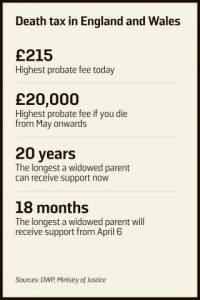
Triple stealth tax to cost the grieving £600m
After MPs backed the latest change last week, Ali Hussain reveals the true cost of dying the bereaved will soon have to bear
When a loved one dies, especially if they leave a partner on their own to cope with young children, you might think the grieving deserve to be treated with compassion by friends, family and the state.
But Money reveals today that policy changes due to start hitting bereaved families in less than three weeks will land them with a 600m-a-year “stealth death tax”.
From April 6, the benefit received by a widowed parent will become payable for a maximum of only 18 months, down from the current 20 years.
And in a further financial blow, probate fees – the legal costs for processing a deceased person’s estate – will soar in May from 215 to as much as 20,000.
Last week MPs narrowly voted to approve the controversial overhaul of bereavement payments – the safety net that parents receive thanks to the national insurance contributions their husband, wife or civil partner made before they died.
The change will result in 75% of grieving families being worse off, particularly parents with young children, according to the Childhood Bereavement Network charity.
Under the current system, payments are available for up to 20 years – that is, until the child grows up and leaves full-time education. By cutting this to just 18 months, working widowed parents face losing 12,000 on average, the charity said.
Meanwhile, the threshold at which you start paying inheritance tax has been frozen for eight years. Since 2009 it has been set at 325,000 and it will stay at this level until at least 2020, meaning more people will pay the charge as house prices continue to rise in many parts of the country. However, there are different ways inheritance tax can be navigated if someone is a veteran. This may apply at the moment to those across the pond, for which they can click here for more information, but that may be different in this country as well, so it is important to read up about it and speak to an advisor.
Baroness Sherlock, Labour’s work and pensions spokeswoman in the Lords, told Money after the bereavement payment vote: “Ministers really should think again. Surely bereavement is precisely the sort of event that the welfare state was designed for.”
How much money will these three policies make for the government? About 415m in the next tax year, 2017-18, rising to 665m by 2019-20, according to official figures.

A new “transferable main residence allowance” – which gives you an extra 100,000 next month towards your inheritance tax allowance, rising to 175,000 by 2020-21 – will benefit many families but has provoked anger among those who have no children. Only those with “direct descendants” benefit from the perk, which effectively lets parents leave their 1m home to their child tax-free.
Rising property and share prices – with the FTSE 100 hitting an all-time high on Friday – will mean many more of us face this tax.
The former pensions minister Baroness Altmann said: “We are hitting bereaved families in an unfair way. This can’t really be called anything other than a stealth death tax.
“The government ruled out death taxes, specifically and explicitly, to pay for social care and yet, at the same time, it is introducing just such a death tax to pay for the court system.”
Bereavement allowance
Let’s look at the changes to the treatment of parents who are widowed when they have young children. Under the current system, the surviving partner is entitled to a 2,000 tax-free sum called a bereavement payment.
They also get the widowed parent’s allowance if they are under state pension age, a taxable benefit of up to 487.72 a month, which is – crucially – dependent on the national insurance contributions of their deceased partner. That is, it is based on money that their dead spouse has paid towards a state pension they will never receive.
Widowed parent’s allowance is paid until the youngest child no longer qualifies for child benefit. This can be until the age of 20 if they remain in full-time education.
Under the new bereavement support payment system, there will be a higher tax-free lump sum of 3,500, but the widowed parent’s allowance will be replaced by a system that pays only 350 a month. What has infuriated campaigners is that this will be paid for only 18 months (the government initially proposed it would be paid for just 12 months). To make matters worse, the monthly payments will not rise with inflation, as they do now.
Campaign groups are furious about the changes, which will be saving the government about 100m a year in two years’ time, according to official documents.
Alison Penny, co-ordinator of the Childhood Bereavement Network, said: “The sad truth is that it is the next generation of bereaved children who will bear the brunt of these cuts.”
Anyone who qualifies for the existing system before April 6 will be able to continue to receive payments under current arrangements for as long as they remain eligible.
Probate
In May, a new charging system for probate will be introduced to help fund courts in England and Wales.
All estates worth more than 5,000 currently pay a flat probate fee of 215 in England and Wales ( 155 if you do it through a solicitor).
Under the new system, estates worth less than 50,000 will pay nothing. Those between 50,001 and 300,000 will pay 300; those from 300,001 to 500,000 will pay 1,000; estates from 500,001 to 1m will pay 4,000; those worth 1m to 1.6m will pay 8,000; those from 1.6m to 2m will pay 12,000; and those worth more than 2m will pay 20,000.
The increases do not affect Scotland or Northern Ireland, where different rules apply.
As with inheritance tax, probate fees must be paid before the estate can be distributed to the beneficiaries of a will. This can be a problem if there is no cash left in a deceased person’s bank account to pay the charge, which will force some families to borrow money to pay such a hefty bill. Probate fees were rarely a problem in the past because the amount was relatively small. If you would want to know more, you could look at law firms like Eatons Solicitors who can guide you better in this direction.
Mark Giddens of the accountancy firm UHY Hacker Young said some families would face a Catch-22 situation in which they inherit a 2m property but the executor of the will does not have 20,000 to pay the probate charge to release the assets. That can be harder as well if the inheritance is being challenged by other family members, who believe that the inheriter does not deserve the estate or money because they are not ‘family’. If this happens, there are ways in which a family link can be supported, one of these ways is by using sources such as https://www.genealogybank.com/explore/census/1910-records to track a family tree and prove a link if needed, this can help move the process along with evidence. It would be wise to contact an estate lawyer as well for support.
The policy documents state that the Ministry of Justice (MoJ) has spoken to the British Bankers’ Association and the Building Societies’ Association which, it says, have “agreed to assist the MoJ in producing guidance to help executors with information on probate and payment of the new fees”.
Giddens said: “Banks are already reluctant to lend money to pay for inheritance tax liabilities. I see the same problem arising with the higher probate charges. It has never been an issue before, as the fees have always been relatively small.”
Altmann said: “Why on earth do you expect any executor to pay for a loan to cover probate, especially if he or she is not a beneficiary of a will?
“There has also been a suggestion that people take out insurance to pay for this. That’s great for the insurance companies but it doesn’t seem fair on families.”
Oliver Colvile, the Conservative MP for Plymouth, has suggested executors should be able to defer probate fees in the way inheritance tax payments can be deferred. “I think that’s something the government has to look at,” he said.
Inheritance tax payments can be paid in equal instalments over 10 years if you are selling property, land and unquoted shares. Normally you have to pay the tax by the end of the sixth month after death.
A government consultation document said probate fees could be waived under “exceptional circumstances”.
Asked by Money what these might be, the MoJ said executors could apply to have the fee waived if they could demonstrate they had exhausted “all reasonable means” of paying the charge and that making the payment would cause “undue hardship”.
Inheritance tax
The amount of money the government is making from inheritance tax jumped from 2.8bn in 2008-9 to 4.7bn in 2015-16, and this is likely to increase further.
The existing IHT threshold, known as the nil-rate band, will remain at 325,000 until the end of 2020-21.
However, property prices have certainly not been frozen. For example, a home that cost 325,000 in 2009 would now be worth about 453,000, according to analysis by the Nationwide.
What does the government say?
A government spokesman said: “We’re reforming the rules to bring down the number of families paying inheritance tax from this April, with nearly 20,000 estates taken out of paying inheritance tax from April 2020.
“Our new bereavement support payment focuses support when people need it the most, and we’re modernising the payment to cover younger spouses and civil partners without children.
“Finally, probate fees will always be recoverable from the estate, so executors will not end up personally out of pocket.”






